 Have you heard of “Seasonal Affective Disorder (SAD)?”
Have you heard of “Seasonal Affective Disorder (SAD)?”
Especially this time of year, you or someone you know may experience feelings of anxiety or depression.
The holiday celebrations are over, the Christmas decorations are coming down, the work and school routines are starting up again, the days are short and the temperatures are cold. Everyone seems grumpier than normal.
If you are facing negative thoughts, rest assured you are not alone!
The numbers are increasing…
Depression affects more than 150 million people worldwide. In the U.S., 1 in 5 adults will experience mental illness in a given year. It has even been estimated that depression may become a leading cause of healthy years lost, behind diet-related illness and disease.
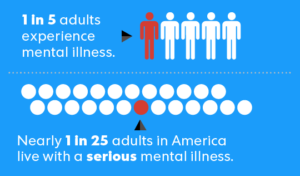 For those struggling with anxiety and depression…it’s important to keep in mind that it’s not your fault, and it’s not a flaw in your character. There are a variety of causes for depression, and there are also some surprisingly great ways to treat it.
For those struggling with anxiety and depression…it’s important to keep in mind that it’s not your fault, and it’s not a flaw in your character. There are a variety of causes for depression, and there are also some surprisingly great ways to treat it.
The Other “SAD”
Even if you eat “pretty good,” the Standard American Diet (SAD!) may very well be contributing to depression because it lacks the nutrients that our brains desperately need to fire properly. And, as more and more Americans deal with anxiety, and even slip into depression, there is less motivation to shop for and prepare nutrient-rich foods, which results in grabbing convenient, highly processed “sugary” and “fried” foods for comfort, escalating the nutrient deficiency that deepens depression…
…what a vicious cycle!
In a story from healthline.com, this is exactly what happened to a 14 year old named Jane. A debilitating panic attack led to her being diagnosed with anxiety and depression and being put on antidepressants. By age 23, after many doctors’ visits and therapy, she was told there was nothing more that could be done. Then, after having a meltdown in front of a nutritionist friend, she was introduced to the idea of trying to change her diet to see if it would make her feel better. Jane ate a somewhat healthy diet, but dinner typically involved unhealthy take-out options, and there was also candy throughout the day and ice cream at night. So, she followed the advice of her friend, which included less sugar, grains and dairy, more healthy fats and protein, and lots and lots of vegetables.
Jane said for the first 3 days she “thought she was going to die” but after a few days her energy level began to soar and “instead of focusing on what I couldn’t eat, I began focusing on how great I felt physically, which made me feel better mentally and emotionally.” Plus, Jane added, “I stopped getting the crazy highs and lows from sugar. I haven’t had an anxiety attack in months and am completely off my antidepressants, which I 100 percent attribute to my diet and lifestyle changes.”
What causes depression?
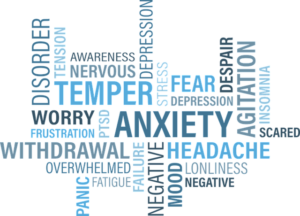 Monoamines are neurotransmitters in our brains that help control the regulation of sleep, energy, appetite and mood. It is believed that people who are depressed have elevated levels of monoamine oxidase (MAO), an enzyme that inactivates “happy” neurotransmitters. The result can be abnormal adaptive responses to stress that can lead to depression.
Monoamines are neurotransmitters in our brains that help control the regulation of sleep, energy, appetite and mood. It is believed that people who are depressed have elevated levels of monoamine oxidase (MAO), an enzyme that inactivates “happy” neurotransmitters. The result can be abnormal adaptive responses to stress that can lead to depression.
To help with this, pharmaceutical companies have created medications that are MAO inhibitors. Meaning, they interrupt or stop the “oxidation” of monoamines in order to preserve these important neurotransmitters, so you feel better.
But, medications are NOT the only solution. Believe it or not, REAL food, specifically vegetables and fruits, are equally powerful at preserving these important neurotransmitters!
How can Greens fight the Blues?
Consuming high amounts of fruits and vegetables have been shown to cut the odds of developing depression by as much as 62%! Studies show the “farmacological” phytonutrients found in fruits and vegetables act as a highly effective, natural MAO enzyme inhibitor.
- Vitamin C aids the production of dopamine, the “zest for life” neurotransmitter, and can be found in abundance in dark leafy greens, such as spinach and kale. Other “greens” that are loaded with Vitamin C include broccoli, cabbage, bell peppers and kiwi!
- Folate (folic acid) is known to help fight depression. Dark leafy greens are loaded with this important B vitamin. Other REAL foods high in folate are legumes, which include beans, peas and lentils, plus eggs, beets, nuts, seeds, and fruits such as oranges, lemons and limes.
- Antioxidants found in REAL foods reduce inflammation, which is associated with greater rates of depression. Pecans, blueberries, strawberries, kale, red cabbage (and even dark chocolate!) are great anti-inflammatory food choices.
Get your daily dose for more happiness!
A large study done in Great Britain found a dose–response relationship between daily servings of fruits and vegetables and life satisfaction and happiness, meaning more fruits and veggies meant more happiness.
Participants who got up to seven or eight servings a day reported the highest life satisfaction and happiness. And these associations remained significant even after controlling for factors such as income, illness, exercise, smoking, and body weight.
For many, fighting depression may really be as simple as learning how to shop, buy and eat at least eight servings of fruit and vegetables a day. We have hundreds of recipes on Eat REAL America to help you achieve this! And, here are some other sure-fire ideas you can start today and you will be at eight servings a day in no time!
- Start a daily smoothie habit = 3 servings
- Enjoy a big veggie-loaded salad with lunch or dinner = 3 servings
- Heaping bunch of roasted or steamed veggies with dinner = 2 servings
- Enjoy “veggie noodles” = 1-3 servings
- Keep cut up veggies on hand for easy snacking (with hummus!) = 1-3 or more servings
Once you are saying “8 or more servings of veggies and fruit a day? I got this!” –
what else can you do to dodge depression?
- Douse the flames of inflammation! Studies have shown chronic inflammation may be part of the culprit when it comes to the relationship of diet and depression. It’s best to reduce your intake of soda, refined grains, processed meats, and highly processed foods. Instead, enjoy a wide variety of vegetables, including the cabbage family “cruciferous” veggies, along with avocados, fruits (especially berries), fish, nuts, whole grains, beans and herbs and spices.
 Include Omega-3 Fatty Acids! Scientists have recently found that societies that don’t eat enough omega-3s may have higher rates of major depressive disorder. Omega-3 fatty acids are unsaturated fats found in oils (and other foods like salmon, anchovies, tuna, flaxseeds, nuts, and dark leafy vegetables) that are “essential” to our well-being. As a double benefit, Omega-3s are good for your heart and help reduce inflammation!
Include Omega-3 Fatty Acids! Scientists have recently found that societies that don’t eat enough omega-3s may have higher rates of major depressive disorder. Omega-3 fatty acids are unsaturated fats found in oils (and other foods like salmon, anchovies, tuna, flaxseeds, nuts, and dark leafy vegetables) that are “essential” to our well-being. As a double benefit, Omega-3s are good for your heart and help reduce inflammation!
- Get your Vitamin D on! Vitamin D receptors are located throughout the body, including our brains. You can consume Vitamin D with foods such as salmon, tuna, sardines, and shrimp. It is estimated that 77-97% of American adults and adolescents have insufficient Vitamin D levels, and this insufficiency has been linked to depression, so it may be worth considering a Vitamin D3 supplement.
- Pump up the Magnesium! We need 400 mg per day, and most Americans average less than 300 mg per day. Magnesium is essential for our response to stress and for easing anxiety. It is also used in the production of neurotransmitters, maintaining our heart rhythm and for glucose metabolism. Whole-grains, nuts, avocados and salmon are great food sources. In some cases, a magnesium supplement might be worth considering.
 Maintain a Healthy Gut! As much as 95% of our serotonin receptors are found in the lining of our gut. Your diet plays a huge role in how diverse and balanced your gut microbes are — and there are 100 trillion “good bacteria” found in our digestive tracts! Bacteria need food, just like we need food. So, when we eat, we are also feeding the bacteria in our digestive system. The same foods that are good for us are good for our bacteria and microbiome. Of course, the same foods that are bad for us also cause problems in our microbiome. Great options include yogurt, kimchi, sauerkraut, pickles, tempeh, miso, Kombucha, and some people elect to use probiotic supplements. Keep in mind, the most important way to feed your microbiome is with fresh REAL (unprocessed) fruits, vegetables, and whole grains.
Maintain a Healthy Gut! As much as 95% of our serotonin receptors are found in the lining of our gut. Your diet plays a huge role in how diverse and balanced your gut microbes are — and there are 100 trillion “good bacteria” found in our digestive tracts! Bacteria need food, just like we need food. So, when we eat, we are also feeding the bacteria in our digestive system. The same foods that are good for us are good for our bacteria and microbiome. Of course, the same foods that are bad for us also cause problems in our microbiome. Great options include yogurt, kimchi, sauerkraut, pickles, tempeh, miso, Kombucha, and some people elect to use probiotic supplements. Keep in mind, the most important way to feed your microbiome is with fresh REAL (unprocessed) fruits, vegetables, and whole grains.
- Ditch processed foods! Eliminate highly processed foods, particularly artificial sweeteners such as NutraSweet. Studies have shown that even at a dose of 25 mg/kg (which was only half the acceptable daily intake set by the FDA) after just eight days, participants “had a more irritable mood, and exhibited more depression” and performed worse on certain brain function tests. For more info, check out our coaching tips on sugar and safe artificial sweeteners.
- Get moving! Exercise should be part of the prescribed treatment for depression (but rarely is)! Studies confirm that exercise is just as effective at treating depression as antidepressant medication! Try to set a goal of walking or jogging 3 times per week — and getting outdoors may be even more beneficial to improving our mood!
Looking for a way to make tempting foods less tempting?
Can a good mood lead to eating good food?
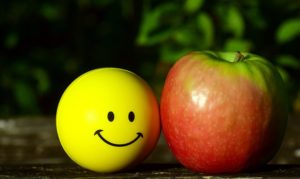 In a recent study, when given a choice between M&M’s and grapes, individuals in a positive mood were more likely to choose the grapes! It’s true! The results of these studies lend support to a growing body of research that suggests that positive mood facilitates resistance to temptation!
In a recent study, when given a choice between M&M’s and grapes, individuals in a positive mood were more likely to choose the grapes! It’s true! The results of these studies lend support to a growing body of research that suggests that positive mood facilitates resistance to temptation!
Even if you aren’t officially diagnosed with anxiety or depression, try and see how eating 8 or more daily servings of fruits and vegetables can truly help you stay motivated and resist temptation. Prove to yourself that a good mood can lead to eating good food! And, that good food can lead to a good mood!
 Want to learn more?
Want to learn more?
If you are ready to seriously take control of your “happy hormones,” we highly suggest you dive all the way into putting these steps into action by checking out Zonya’s online 4-part course, How Greens Fight the Blues. Whether your goal is to fight depression, anxiety or even dementia, discover which foods and supplements are scientifically shown to positively impact your mental health – all by eating the most DELICIOUS FOOD of your LIFE!
We would love to hear from you — please share your ideas about foods that help dodge anxiety and depression!
References
- Beezhold BL, Johnston CS, Daigle DR. Vegetarian diets are associated with healthy mood states: a cross-sectional study in Seventh Day Adventist adults. Nutr J. 2010 Jun 1;9:26.
- P. Forsythe, N. Sudo, T. Dinan, V. H. Taylor, J. Bienenstock. Mood and gut feelings. Brain Behav. Immun. 2010 24(1):9 – 16
- G. Reid. Neuroactive probiotics. Bioessays 2011 33(8):562
- M. Lyte. Probiotics function mechanistically as delivery vehicles for neuroactive compounds: Microbial endocrinology in the design and use of probiotics. Bioessays 2011 33(8):574 – 581
- E. A. Mayer. Gut feelings: The emerging biology of gut-brain communication. Nat. Rev. Neurosci. 2011 12(8):453 – 466
- A. V. Rao, A. C. Bested, T. M. Beaulne, M. A. Katzman, C. Iorio, J. M. Berardi, A. C. Logan. A randomized, double-blind, placebo-controlled pilot study of a probiotic in emotional symptoms of chronic fatigue syndrome. Gut Pathog 2009 1(1):6
- J. Bienenstock, S. Collins. 99th Dahlem conference on infection, inflammation and chronic inflammatory disorders: Psycho-neuroimmunology and the intestinal microbiota: Clinical observations and basic mechanisms. Clin. Exp. Immunol. 2010 160(1):85 – 91
- M. Messaoudi, R. Lalonde, N. Violle, H. Javelot, D. Desor, A. Nejdi, J.-F. Bisson, C. Rougeot, M. Pichelin, M. Cazaubiel, J.-M. Cazaubiel. Assessment of psychotropic-like properties of a probiotic formulation (Lactobacillus helveticus R0052 and Bifidobacterium longum R0175) in rats and human subjects. Br. J. Nutr. 2011 105(5):755 – 764
- https://www.psychologytoday.com/us/blog/the-integrationist/201310/depression-wont-go-away-folate-could-be-the-answer
- X Guo, Y Park, N D Freedman, R Sinha, A R Hollenbeck, A Blair, H Chen. Sweetened Beverages, Coffee, and Tea and Depression Risk among Older US Adults. PLoS One. 2014 Apr 17;9(4):e94715.
- M Lucas, E J O’Reilly, A Pan, F Mirzaei, W C Willett, O I Okereke, A Ascherio. Coffee, caffeine, and risk of completed suicide: Results from three prospective cohorts of American adults. World J Biol Psychiatry. 2014 Jul;15(5):377-86.
- M Lucas, F Mirzaei, A Pan, O I Okereke, W C Willett, E J O’Reilly, K Koenen, A Ascherio. Coffee, caffeine, and risk of depression among women. Arch Intern Med. 2011 Sep 26;171(17):1571-8.
- A L Klatsky, M A Armstrong, G D Friedman. Coffee, tea, and mortality. Ann Epidemiol. 1993 Jul;3(4):375-81.
- R G Walton, R Hudak, R J Green-Waite. Adverse reactions to aspartame: double-blind challenge in patients from a vulnerable population. Biol Psychiatry. 1993 Jul 1-15;34(1-2):13-7.
- P Humphries, E Pretorius, H Naude. Direct and indirect cellular effects of aspartame on the brain. Eur J Clin Nutr. 2008 Apr;62(4):451-62.
- A Samuels. There really is no controversy. European Journal of Clinical Nutrition (2009) 63, 1044.
- T J Maher, R J Wurtman, Possible neurologic effects of aspartame, a widely used food additive. Environ Health Perspect. 1987 Nov;75:53-7.
- K R Tandel. Sugar substitutes: Health controversy over perceived benefits. J Pharmacol Pharmacother. 2011 Oct-Dec; 2(4): 236–243.
- G N Lindseth, S E Coolaha, T V Petros, P D Lindseth. Neurobehavioral Effects of Aspartame Consumption. Res Nurs Health. 2014 Jun;37(3):185-93.
- C R Whitehouse, J Boullata, L A McCauley. The potential toxicity of artificial sweeteners. AAOHN J. 2008 Jun;56(6):251-9
- https://www.ncbi.nlm.nih.gov/pubmed/15671130
 LEARN MORE ABOUT THE NAPKIN!
LEARN MORE ABOUT THE NAPKIN!
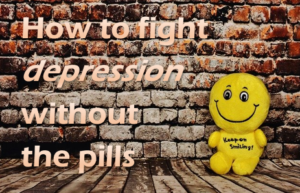
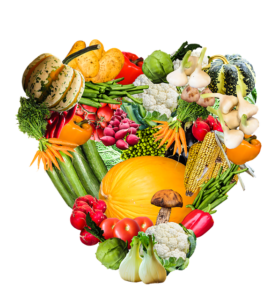
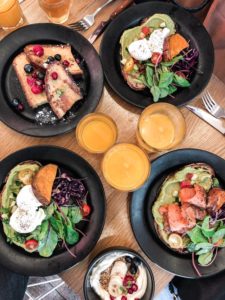


So much information, Thank you!